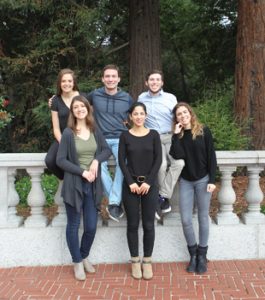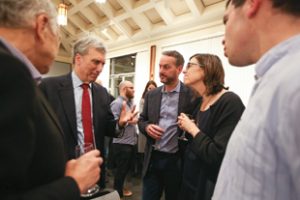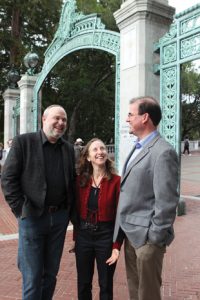Making strides: Israel studies flourishing at Cal
January 3rd, 2017
 As a U.C. Berkeley freshman, Jackson Block looked in vain for a course about Israeli high-tech innovation. Rather than wait for one to turn up in the catalog, he went ahead and created the class himself.
As a U.C. Berkeley freshman, Jackson Block looked in vain for a course about Israeli high-tech innovation. Rather than wait for one to turn up in the catalog, he went ahead and created the class himself.
That kind of enterprising spirit is built into the Israel Studies fellowship, where Block had free rein to design a syllabus, book guest lecturers and co-teach a class on his subject of interest. Now a senior majoring in business, Block has co-taught “Innovation & Entrepreneurship: The Case of Israel” every year since.
The fellowship, and the Berkeley Institute for Jewish Law and Israel Studies that runs it, is “a hub and a resource to spearhead the initiatives I want to start,” Block said, “and it has empowered me as a leader.”

Israel Studies cohorts (front, from left) Joshua Woznica, Sophia Gluck, Jackson Block, Leora Ghadoushi, Emili Bondar and Rebecca Golbert, and (back, from left) Ron Hassner, Kenneth Bamberger and Claudia Waldman photo/michael fox
Since its founding in 2011, the institute has emerged as one of the country’s renowned academic centers for Israel Studies, according to co-founder Ken Bamberger, a Berkeley law professor who serves as co-faculty director.
It is connected to the university through the law school, running programs on the main campus while remaining financially independent. But it remains “part and parcel of the social and intellectual fabric of campus,” according to the institute’s executive director Rebecca Golbert.
The program’s 12 fellows create and teach many of the Israel Studies courses, called DeCals. They have studied Israeli minorities in film and Jewish theater, organized screenings of Israeli films and booked speakers, all with the support of the institute, which launched the fellowship three years ago.
For a campus that features an active BDS movement and often serves as a stage for hostile anti-Israel protests, the Israel Studies program is a relative island of calm.
As Bamberger notes, Cal’s scholarly approach to the study of Israel has mellowed the campus climate by “creating multiple ongoing opportunities for students and faculty to delve deeply into the range of aspects of Israeli society and engage intellectually. That’s what universities do well.”
Other schools, such as UCLA, San Francisco State University and U.C. Santa Cruz, offer Jewish Studies and Israel Studies programs, some with their own faculty. The Berkeley institute operates differently. It does not hire professors or boast endowed chairs, nor does it offer a catalog of courses or award a degree (though the university does offer a minor in Jewish Studies.)
Instead, the institute adopts an interdisciplinary approach, bringing visiting scholars to teach in a dozen U.C. Berkeley departments. This year, more than 200 students are taking courses from 22 Cal professors and visiting scholars from Israel, covering such topics as Israeli history, gender issues in the military and Israeli constitutional law.
The scholars come from leading Israeli institutions such as Hebrew University, Tel Aviv University, Bar-Ilan University, IDC Herzliya and Ben-Gurion University. Past guest speakers include Israeli Supreme Court justices, Knesset members, former British Chief Rabbi Jonathan Sacks and a one-time Nazi war crimes prosecutor from the Nuremberg Trials.

Israel Studies fellows (clockwise, top left) Sophia Gluck, Joshua Woznica, Jackson Block, Emili Bondar, Leora Ghadoushi and Claudia Waldman photo/michael fox
“It means that the study of Israel is not siloed, but rather integrated into the range of disciplines across campus,” said Bamberger.
While the visiting scholars often further their research during their time on campus, as well as participate in faculty colloquiums, institute leaders say the Israel Studies program emphasizes students first and foremost. Student suggestions drove Bamberger and his colleagues to establish the institute in the first place.
“It was a product not so much of BDS efforts on campus, but the intellectual vacuum that accompanied it,” recalled history professor Ron Hassner, who serves as co-faculty director with Bamberger. “Students came to us and said, ‘There’s a lot of faculty organizing on the anti-Israel side of things. Where’s the other side?’ To some extent they shamed us into admitting that we had neglected that part of cultural life, that Cal had no history of teaching classes on Israel.”
Hassner says one of the key outcomes of the institute-sponsored programs is that Jewish students at U.C. Berkeley now “hold their heads high.”
“Simply because they are so well armed with information, academic skills and sources, they can counteract the most insidious claims they hear on Sproul Plaza,” he said, referring to the frequent anti-Israel rallies held on Cal’s central square. The Israel Studies program “empowered students to speak confidently and more knowledgably.”
While Hassner personally supports a Jewish and democratic State of Israel, he insists on strict fact-based impartiality in his classroom, and says the Jewish Studies program is similarly dispassionate.
“The institute does no political advocacy,” he said. “All we do is teach, and most things have no political bearing. It’s about poetry, revisions in criminal law, history of the Israeli legal system, architecture. Issues are covered that were never covered on the Berkeley campus.”
The student fellows may have diverging interests, majoring in business, political economy, law or linguistics, but all have a passion for studying Israel in an academically rigorous environment.
Nir Maoz always knew he wanted to be a lawyer. Learning about Israel, the country of his birth? Not so much.
At least, not until Maoz heard about the institute five years ago when he came to Cal as a freshman. After attending a lecture sponsored by the institute, he found himself curious to know more about his homeland, especially from a scholarly perspective.
He signed up for an Israeli constitutional law class in the legal studies department, taught by a visiting Israeli professor brought in by the institute.
“It was one of the hardest classes I took at Cal,” Maoz recalled. “Maybe it’s an Israeli thing. They take teaching very seriously and they don’t baby you. That was the beginning of my journey with the institute.”
Maoz, 23, joined the first cohort of fellows in 2013 and remembers being free to pursue his interests through the program. He designed and co-taught with Bamberger a DeCal course on “the paradigms of Jewish identity,” and as a junior he took Bamberger’s Jewish law course, one usually reserved for post-grad law students. He also co-taught Jackson Block’s DeCal course on Israeli innovation.

Jewish Theological Seminary Chancellor Arnold M. Eisen (on left) was a guest speaker at the Berkeley Institute on Oct. 27, 2016.
Maoz graduated last year and is now a law student at Berkeley. He maintains ties with the institute and the fellowship, now as an elder statesman of sorts.
“It’s given me a greater understanding [of Israel],” he said of his involvement. “My bookshelf is full of books about Israel, a Talmud set, history books, political books. That wouldn’t have happened without the institute. I’m better able to articulate my beliefs.”
The program is not all book learning. Some of the fellows’ best moments have come at informal faculty coffees and one-on-one meetings between students and scholars.
Fellow Claudia Waldman, 20, had a close encounter with Jewish Theological Seminary Chancellor Arnold Eisen early this semester when she met the New York scholar before an institute-sponsored lecture. “We talked about engagement of Jewish youth,” recalled the Alameda native, who says the fellowship has deepened her connections to Judaism.
Daniella Wenger, 20, grew up in a Conservative home in Los Angeles and attended Jewish day schools. She took to Cal’s Jewish life right away, connecting with Hillel, the Jewish Student Union and Challah for Hunger.
Like others who became fellows, she wanted to augment her Jewish and Israel connections with solid scholarship.
“The institute is very progressive in terms of speakers,” Wenger said. “It enhanced my academics. I spent last summer in Israel working at [financial firm] Deloitte, and I was able to ask co-workers about things I learned at the institute.”
Such crosscurrents cheer Hassner. In recent years the tenured history professor has witnessed not only the growth of the institute, but also the founding of Berkeley’s Center for Jewish Studies and the acquisition of the Magnes Collection of Jewish Art and Life. Taken together, these resources have made Cal a player in the academic study of Jews, Judaism and Israel.
Hassner noted how the institute’s interdisciplinary approach, bringing Israeli professors and staging monthly colloquiums where scholars share research, has had ripple effects across campus, not the least of which is the fostering of a more positive view of Israel among students and faculty alike.
Joshua Woznica spent his teen years at the shul with the pool.

Israel Studies faculty facilitators Ken Bamberger (left), Rebecca Golbert and Ron Hassner photo/michael fox
That’s the nickname of Stephen Wise Temple, a Reform synagogue in Los Angeles, with a large campus that features a swimming pool. His father, David Woznica, has been a rabbi there since 2001; his mother works for the Jewish Federations of North America.
Woznica, now 22, grew up steeped in Judaism and Jewish life. At Cal he served as president of the Jewish Student Union, participated in Hillel events and has always considered himself ardently pro-Israel.
The Israel Studies fellowship, which he joined in 2014, has helped him understand why. “It has solidified my beliefs,” Woznica said. “It’s a place you can learn and explore Israel from a reasoned approach.”
He took a constitutional law class taught by one of the visiting Israeli scholars, and last semester, Woznica co-facilitated the innovation and entrepreneurship class with Block and Maoz.
For one session he booked an Israeli high-tech entrepreneur who found a way to fight infections by developing a wristband for hospital employees that buzzes if they forget to wash their hands.
More recently, he traveled to Los Angeles with Hassner and Golbert to meet potential donors. Since the institute is 100 percent self-sustaining, constant fundraising is part of the job for senior staff.
“I’d never done anything like that,” Woznica said of the meeting. “It made me take a step back and think about why I like the institute so much, how it’s different from other Israel-related entities in that it’s the only one that brings in serious academic material.”
In 2018, the institute will host the annual conference of the Association of Israel Studies, which in years past has been held at Brandeis University and other leading colleges in Europe and Israel.
“It’s a pretty big deal,” Bamberger said. “The AIS holds its conferences on campuses that have reached pre-eminence in Israel Studies, and that’s led to their selection of Berkeley as the 2018 host.”
Bamberger says one of the institute’s goals is to see a Jewish Studies major and Israel Studies minor at U.C. Berkeley within 10 years. It’s an audacious goal in that no American university offers a degree in Israel Studies, according to Ariel Roth, executive director of the Washington, D.C.-based Israel Institute, which monitors and supports the academic study of Israel in programs like the one at U.C. Berkeley.
“Area studies are out, and interdisciplinary studies are in,” Roth said. “Given that academic climate, the proliferation of Israel Studies is very impressive. I consider what [Bamberger and his colleagues] are already doing to be a tremendous contribution to expanding the breadth of Israel Studies.”
Jackson Block is one of the beneficiaries of that expansion. He has traveled to Israel since joining the fellowship and says his academic training at Cal enhanced the experience immeasurably. He noted that his trip companions noticed he had “a glow in my eyes.”
“When the tour guide was talking about events in Israeli history, I had more of a contextual background,” Block said. “It wasn’t just the guide explaining. I was able to dive deep into it, and ask more significant questions.”
After graduating next spring, Block plans to volunteer as a math instructor in inner-city schools with Teach for America. He credits his teaching experience in the Israel Studies fellowship with sparking his desire to teach in underserved communities.
He realizes U.C. Berkeley is perceived by many to be a hostile environment to Jewish students and supporters of Israel. But he insists his experience has been the polar opposite, thanks largely to his involvement with the institute and the Israel Studies fellowship.
“It’s where I’ve been able to critically engage in Jewish identity,” he said, “and it’s been a special place for that reason.”
And for good measure, he added, “My bubbe is super proud.”
Source: “Making strides: Israel studies flourishing at Cal,” J Weekly, December 15, 2016